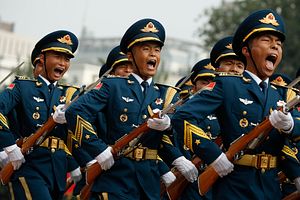The Chinese military has come out in full support of the ruling Communist Party’s proposed constitutional amendments, including a controversial measure that would allow President Xi Jinping to remain in office for life.
In a front page editorial on Tuesday, February 27, the People’s Liberation Army (PLA) Daily announced that the PLA and the People’s Armed Police (PAP), China’s internal security force, “fully agrees [with] and will resolutely support… the constitutional amendment proposal.” In an apparent warning to detractors, the PLA and the PAP promised to be “loyal advocates” and “staunch defenders” of the constitution. To remove all doubts, the editorial lists support from representatives from across the PLA, including the high command organs, the services and branches, the joint theater commands, and the military academies.
The support of China’s military and its internal security force is significant in an environment where Xi faces numerous political enemies both within the party and the military. Ultimately, a tight grip on the gun provides Xi with the backstop against potential political backlashes and popular dissent. In addition, the PLA is by far the most powerful group at the National People’s Congress, China’s parliament, with 269 seats out of a total of 2,980 seats. Indeed, there is little doubt that the proposed amendments would be passed by the Congress when it next meets in early March.
However, the full endorsement of the PLA and the PAP has also underlined the limits of Xi’s power. The need for such a staunch declaration of loyalty speaks volume of the anxiety within the military and party elite about the direction of Chinese politics.
These proposed amendments represent the latest step in Xi’s quest for complete power. Interestingly, the role of president is largely ceremonial — Xi’s real power comes from his control of the Communist Party and the military, both of which he heads.
Since coming to power in November 2012, Xi has paid particular attention to consolidating his control over China’s vast military. As the chairman of the Central Military Commission (CMC), China’s supreme military body, Xi has purged hundreds of high-level military officials through his massive anti-corruption drive. These include Guo Boxiong and Xu Caihou, the powerful former vice chairs of the CMC.
More recently, just before the 19th Party Congress in October 2017, Xi purged then-CMC members Fang Fenghui and Zhang Yang. Zhang’s alleged suicide shortly after his downfall was a visceral reminder of the high stakes at the top of China’s elite politics.
The inclusion of Zhang Shengmin, the head of CMC Commission for Discipline Inspection, on the CMC is clear indication that Xi intents to put military discipline front and center, and continue the campaign against his detractors within the PLA.
Xi has also promoted his own crop of military officers to key positions across the PLA. In fact, most PLA organizations saw leadership changes in 2017, and the PLA delegation to the 19th Party Congress had a staggering 87 percent of first-timers, representing a change of guard.
In addition to controlling personnel, Xi has made structural changes to the CMC that further consolidate his hold over the military. For example, Xi has reinforced the “CMC Chairman Responsibility System” under which he has become the ultimate decision-maker. This contrasts with the experience of Xi’s predecessors, Hu Jintao and Jiang Zemin, both of whom had to share power with their CMC vice chairs. Moreover, at the 19th Party Congress, Xi downsized the CMC from 11 to seven members, which further centralized military power.
The latest declaration of support for Xi’s ambitions by the PLA and the PAP is a potent reminder of the continued relevance of China’s military and internal security force as important political actors. Xi has long recognised the importance of controlling the gun for his political future, and this will not change in the years ahead.
Adam Ni is a researcher at the Strategic and Defence Studies Centre, Australian National University. His main areas of interest include China’s foreign and security policy. Find him on Twitter @adam_ni.

































